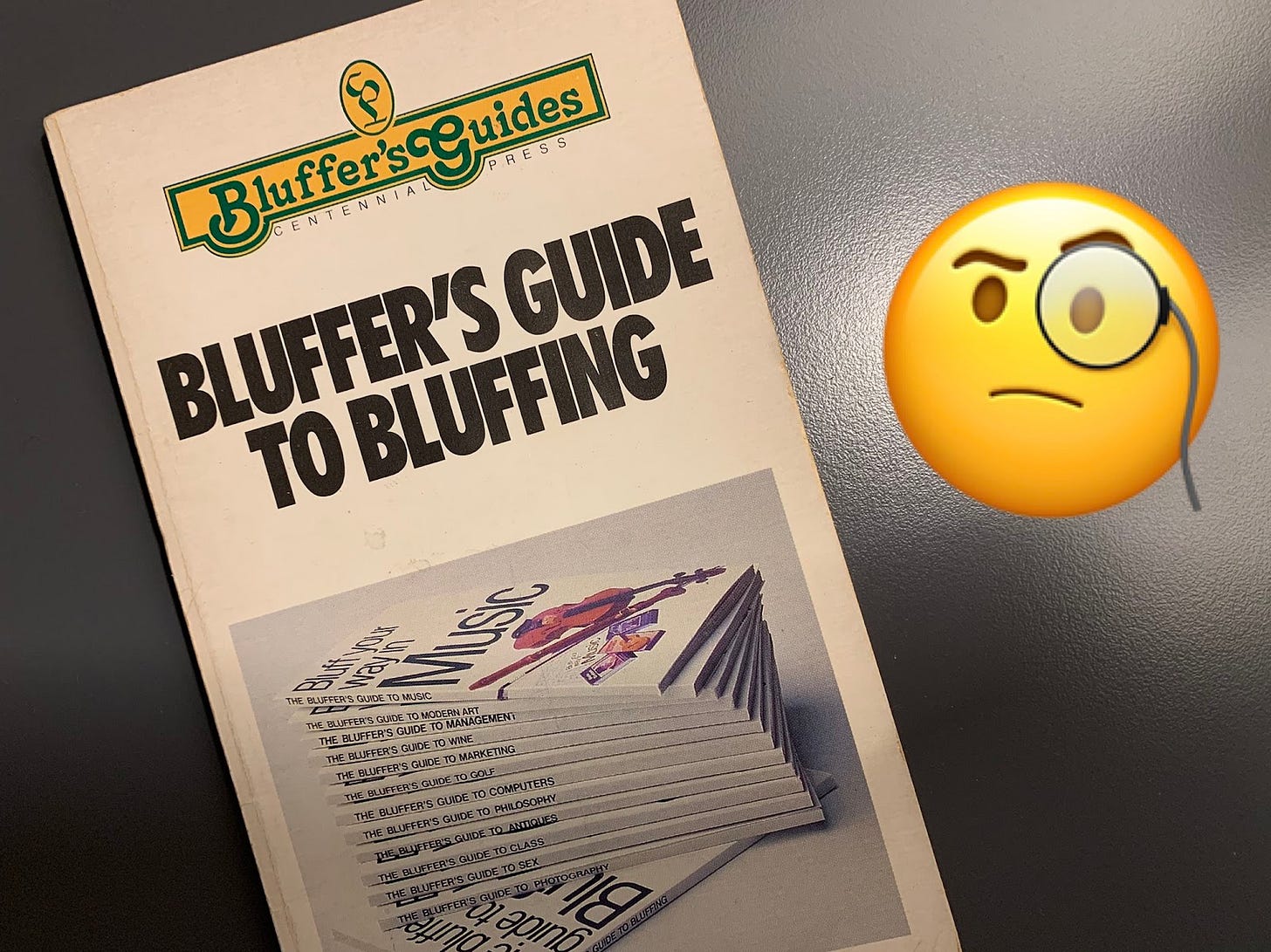If you only buy one Bluffer’s Guide, it should clearly be the Bluffer’s Guide to Bluffing. It’s like using your one wish to wish for infinite wishes. And so, on a recent pilgrimage to The Strand in New York City, I snapped up this out-of-print gem with the goal of bluffing my way through it.
What does that even mean? The Bluffer’s Guides all define “bluff” in the poker sense of the word: It’s a way to “hold your own (not actually to humble or defeat) against a social, intellectual, or business opponent.” Not lying, per se, but not revealing your ignorance. The series began in England in 1965 and sold so well that the U.S. publisher of Cliff’s Notes bought the Stateside rights, though the idea didn’t quite translate. Unlike the later Complete Idiot’s Guides or For Dummies series, the Bluffers assume you’re a competent sloth rather than an ambitious moron. It’s self-effacing self-help.
The premise is that there are so many things to know these days that “the chances of being more than partially well-rounded (much less semi-circular) are slight.” But at the same time “the means of getting to know about almost any topic are unfortunately reasonably accessible.” It’s a Catch-22 for people who haven’t read the novel and aren’t precisely sure what the term means but need to use it anyway — and so we must bluff.
Phrases like “I used to think…” or “There’s something to be said for…” are ways to infuse deniability into all that you say, but the best bluffers really go for it. They pretend they have a full house when they’re really holding both jokers, a Skip-Bo card, and a crumpled receipt.
And though the Bluffer’s Guides stress that hoodwinking is not the goal, they identify Wilson Mizner, one of the great con men of the last century and half the subject of GWQ No. 28, as The Master Bluffer who embodied four key qualities:
1. Quick wit. “To what did he owe his success?,” a reporter once asked Mizner. “Impudence,” he responded.
2. Sheer audacity. On his deathbed, Mizner emerged from a coma to insult the priest at his bedside: “Why should I talk to you? I’ve just been talking to your boss.”
3. Acting skill. When a judge asked Mizner if he was trying to show contempt for the court, he replied, “No, I’m trying to conceal it.”
4. Attention to detail. Among Mizner’s grifts was a factory for brand-new antique furniture, which he had his workers distress with pellet gun fire. “Shoot from the side, boys,” he directed. “A worm always charges at a piece of furniture from an angle.”
Are these anecdotes verifiable? Remember the Bluffer’s motto: dum spiro bluffo. Which, assuming you trust Bluffer’s Latin, translates as: While I breathe, I bluff.
Quick quips; lightning
“The hardest tumble a man can take is to tumble over his own bluff.”
— Ambrose Bierce
“It’s so simple to be wise. Just think of something stupid to say, and then don’t say it.”
— Sam Levenson
“Everyone is ignorant, just on different subjects.”
— Will Rogers
Speaking of…
Oneupsmanship
Damage control
Get Wit Quick No. 155 is all you need to know about bluffing, or so I once thought. The Bluffer’s Guide series is still in print in the UK, though arguably that country and its leadership have so embraced the bluff that a little actual knowledge would be welcome. That said, my dubious enthusiasm for Boris Johnson’s entertainment value is extensive and well-documented. Pretending you’ve read Elements of Wit: Mastering The Art of Being Interesting is a great way to bluff through a conversation with me, but there’s no need to bluff your way around the ❤️below.






On plagiarism, who stole from who - did Wilson Mizner steal from Mae West (angry Judge: "Are you showing contempt of court?". A sassy Mae West: "no, I'm doing my best to hide it") or did Mae West (or her screenwriters) steal from Mizner (or have him on staff as a gag writer)?